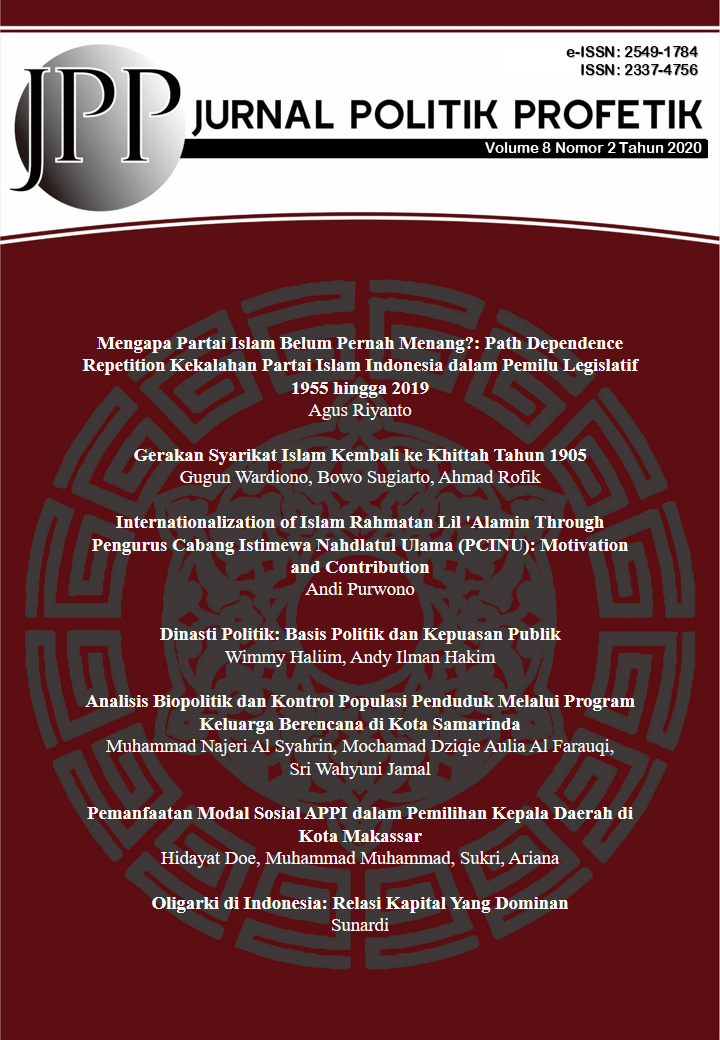DINASTI POLITIK: BASIS POLITIK DAN KEPUASAN PUBLIK
Abstract
The opening of political access in a country that was going through a period of democratic transition gave rise to "little kings" through the practice of political dynasties in some regions. They fill the local political space by restructuring patronage networks and strengthening their social, economic and political bases in order to maintain their power. This kind of dynastic political practice generates negative sentiments towards the performance of the bureaucracy as the public policy tend to be beneficial for a particular political family. The research focuses on the impact of the Sutrisno family's political dynasty through the bureaucracy on the level of community satisfaction towards the performance and achievements of their programs. Given the impact of the Sutrisno family's dynastic political practices, some of them show an anomaly. The findings illustrate the high level of public satisfaction with the performance of the bureaucracy in the health, education, and economy sectors. Apart from the fact that the Sutrisno family dynasty was politically established and had consequences for control of the bureaucracy, the social base of the Sutrisno family network also played an important role in increasing public acceptance of bureaucratic work programs in various fields.
Downloads
References
Akbar, Paisal & Eko Priyo Purnomo, “Model Dinasti Politik Di Kota Bontang” dalam Jurnal Wacana Politik, Vol. 4, No. 2 (2019), h. 145-156.
Bathoro, Alim. “Perangkap Dinasti Politik dalam Konsolidasi Demokrasi” dalam Jurnal FISIP UMRAH, Vol. 2, No. 2 (2011), h. 115-125.
Bimantara, Novendra & Priyatno Harsasto, “Analisis Politik Dinasti di Kabupaten Kediri” dalam Journal of Politic and Government Studies, Vol. 7, No. 04 (2018), h. 201-210.
Cahyaningtyas, Nilam & Mohammad Arif Affandi, “Politik Dinasti Di Kabupaten Kediri: Pertukaran Sosial Tim Pemenangan Bupati Haryanti-Masykuri Dengan Warga Desa Pare Lor Kecamatan Kunjang” dalam Paradigma, Vol. 6, No. 1 (2018), h.1-8.
Creswell, John W. Qualitative Inquiry and Research Design: Choosing Among Five Approaches, 3rd ed. USA: Sage Publications, 2013.
Hadiz, Vedi. Dinamika Kekuasaan: Ekonomi Politik Indonesia Pasca-Soeharto. Jakarta: Pustaka LP3ES Indonesia, 2005.
Haliim, Wimmy. “Perspektif Pertukaran Sosial dalam Perilaku Politik Masyarakat pada Pilkada Kota Malang 2013” dalam Politik Indonesia: Indonesian Political Science Review, Vol. 2, No. 2 (2017), h. 201-226.
Mietzner, Marcus. Indonesia‟s 2009 Elections: Populism, Dynasties and the Consolidation of the Party System. Sydney: Lowy Institute, 2009.
Mukhtar, Umar. “Kabupaten Kediri Catat Dinasti Politik Pertama dan Terlama” dalam https://www.republika.co.id/berita/nasional/politik/17/01/07/ojej10382-kabupat en-kediri-catat-dinasti-politik-pertama-dan-terlama diakses 1 November 2020.
Nuritomo & Hilda Rossieta, “Politik Dinasti, Akuntabilitas, Dan Kinerja Keuangan Pemerintah Daerah Di Indonesia” dalam Simposium Nasional Akuntansi XVII, Mataram-Lombok, 24-27 September (2014).
Suharto, Didik Gunawan, Ismi Dwi Astuti Nurhaeni, Mantrini Indri Hapsari & Lungid Wicaksana, “Pilkada, Politik Dinasti, dan Korupsi” dalam Prosiding Pelaksanaan Pilkada Serentak yang Sehat, Jujur, Adil dan Akuntabel - Pertemuan Forum Dekan Ilmu-Ilmu Sosial PTN Se-Indonesia, Tanjungpinang, 15 November (2017).
Susanti, Martien Herna. “Dinasti Politik dalam Pilkada di Indonesia” dalam Journal of Government and Civil Society, Vol. 1, No. 2 (2017), h. 111-119.















